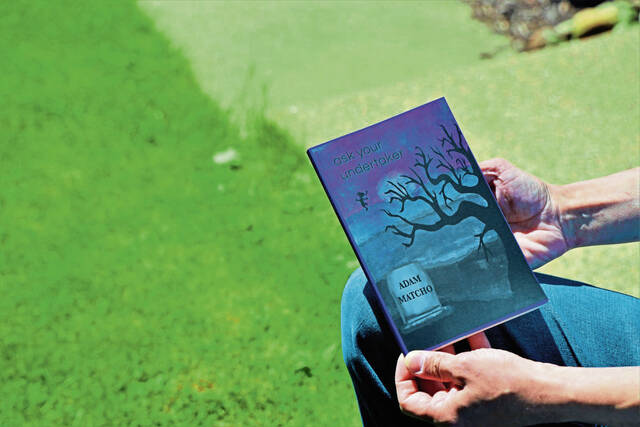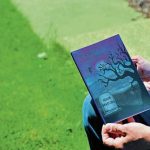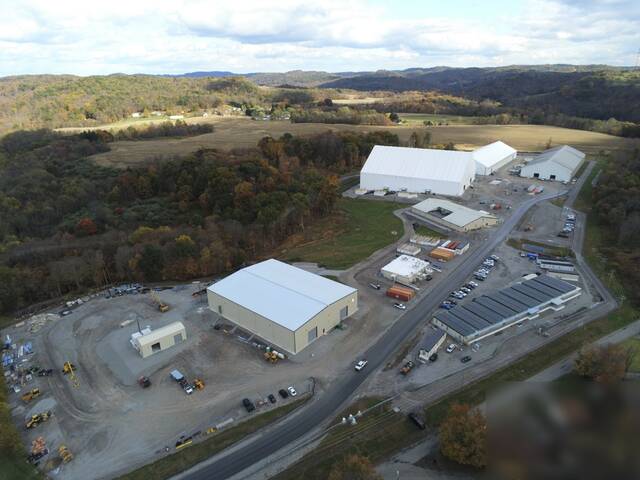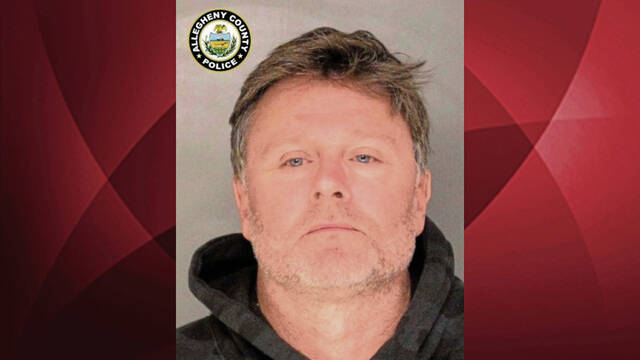You won’t need a primer on poetic pentameter to find enjoyment and meaning in Adam Matcho’s latest collection.
Some might call it poetry for working stiffs.
The 90 poems the Washington Township writer included in “Ask Your Undertaker” are simple, deftly crafted vignettes that immediately feel familiar.
Big-box retail stores, dive bars and the streets of Western Pennsylvania towns make appearances in slice-of-life poems that reveal Matcho’s personal experiences, encounters and observations.
The book could be a good entry point for people who might never have considered reading poetry.
“I think a lot of people still associate poetry with Shakespeare or some other work that can be a bit impenetrable,” Matcho said. “But whether it’s poetry or fiction, I appreciate brevity. I appreciate when one word is used instead of three if it works, so I try to take that approach. I think it creates a level of accessibility that makes my books not too taxing to read.”
While Matcho’s collection touches on topics and scenarios ranging from opioid addiction and race relations to a circus that shows up at the local mall and a diary entry by Judas Iscariot, it is at its core a commentary on life through the lens of a working-class family man.
Matcho, 42, works as a retail manager and his wife is in the medical field. They have two children.
He has worked as a gas station attendant, a sandwich artist, a clerk in a novelty shop, a gold buyer and as an obituary writer — a job that provided the source for the book’s title.
“I was thinking about how people always use the phrase ‘bad things happen in threes,’ ” Matcho said. “But when I hear that, I think: Ask your undertaker if bad things only happen in threes. They’re going to tell you it doesn’t work like that. There’s death around us all the time. We just don’t see all of it happening.”
In addition to “Ask Your Undertaker,” Matcho’s published works include a collection of essays, a poetry chapbook and a previous collection of poetry titled “Love Songs From Flood City.”
Born in North Dakota, Matcho moved frequently for his father’s military career. The family settled in Johnstown when he was 15.
Matcho said writing was the only thing that really stuck when he attended school.
“I always was better at writing than any other subject, but I really didn’t know that I enjoyed writing poetry or anything like that until much later,” he said. “I think poetry grew out of my love for music and lyrics.”
A graduate of the writing program at the University of Pittsburgh at Greensburg, Matcho has published work in venues that include Tears in the Fence, Nerve Cowboy and Sterling Clack Clack.
Lori Jakiela, a professor of English and creative writing at Pitt-Greensburg, said Matcho was one of her first students when she began teaching at the campus.
She said Matcho is not aware of the impact he had on her as a teacher.
“I had come back home to Pittsburgh after years in New York,” she said. “My father was dying, my mother was dying and I got this job teaching that I wasn’t even sure I wanted.
“And then I met Adam and everything, selfishly for me, opened up,” Jakiela said. “I’ve never told him this, but he was such a light. Students never know how important they are to their teachers, how much they change us and impact us even though we often get the credit for that on the other end.”
Jakiela said Matcho’s writing has “this unique sensibility — funny, sharp, incisive and true. … He writes so honestly and with great humanity and beauty.”
Rather than flights of fancy, Matcho’s poetry is grounded in day-to-day struggles that he has experienced or witnessed. They feel genuine because they are rooted in reality.
“I like to follow the advice from the writer William Carlos Williams, who told us to make the local universal,” Matcho said. “I think anybody can understand what having your grandma in ICU means or something as simple as wanting to call off work but being afraid to do it, which are all subjects for poems in the book.”
Matcho said “Ask Your Undertaker” was written and assembled during a break from writing a novel set in his adopted hometown of Johnstown.
Now that the poetry book has been published, he plans to return to working on the novel.
Writer Dave Newman, who is married to Jakiela, said Matcho stands apart from many of today’s poets.
“Poetry is an odd American art form because it’s completely dominated by professors,” said Newman, the author of two novels and two poetry collections. “Then appears ‘Ask Your Undertaker’ by Adam Matcho, who is an assistant manager at a big-box store. His perspective completely shifts our ideas about poetry.
“The writing is at the same high level you’d expect from a professor, but suddenly the content shifts into this place of fearlessness and truth and amazing storytelling.
“Suddenly, the poems don’t require roses to have beauty. Adam writes about work — about jobs and how they impact our lives — in a way that never appears any more in poetry or maybe never appeared in poetry.”
Matcho’s other books are “The Novelty Essays” (WPA Press), “Six Dollars an Hour: Confessions of a Gemini Writer” (Liquid Paper Press) and “Love Songs From Flood City” (Low Ghost Press).











